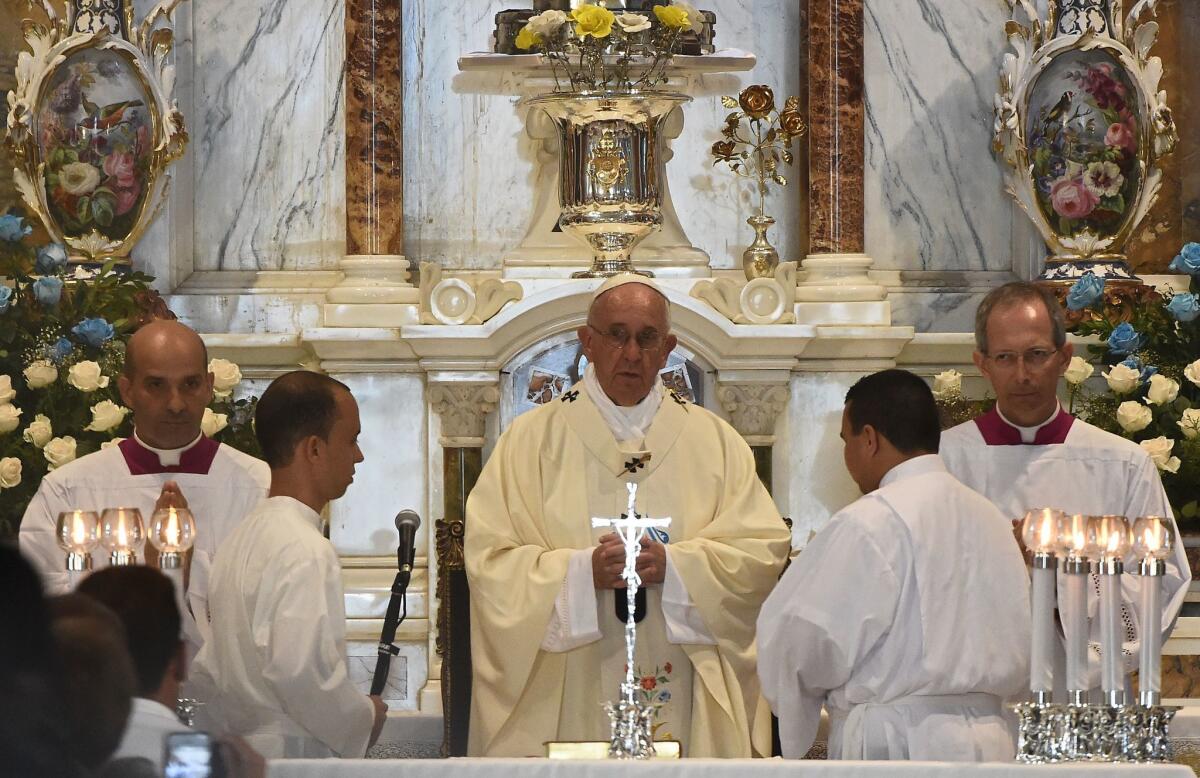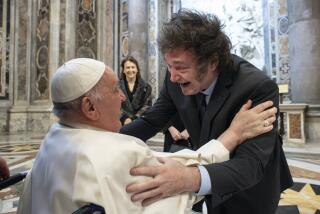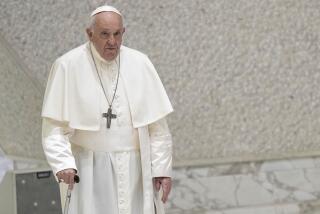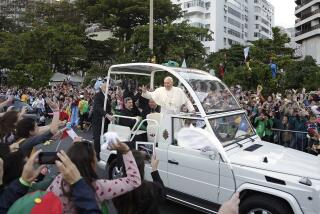Pope Francis calls for ârevolution of tendernessâ in Cuba

Pope Francis conducts Mass at the basilica to Our Lady of Charity of El Cobre in Santiago de Cuba on Sept. 22.
Reporting from Santiago, Cuba â Pope Francis on Tuesday called on Cubans to rediscover their Roman Catholic heritage and live a ârevolution of tenderness,â speaking in a country whose 1959 revolution installed an atheist, communist government that sought to replace the church as the guiding force in peopleâs lives.
Francis addressed a Mass at Cubaâs holiest shrine with Cuban President Raul Castro in attendance. Later in the day, he was scheduled to fly to Washington for the first visit to the United States.
The pontiffâs homily in the Sanctuary of the Virgin of Charity of El Cobre was the latest in a series of carefully worded critiques of the Cuban system during his four-day trip.
At his Sunday Mass in Havana, he urged thousands of Cubans to serve one another and not an ideology. He also encouraged them to refrain from âlooking to one side or the other to see what our neighbor is doing or not doing,â words that resonated in a nation where the government controls most aspects of life.
Some 10% of Cubans regularly celebrate Mass, and the church has been trying to seize on the softening of the Cuban system to rekindle the countryâs religious heritage.
âGeneration after generation, day after day, we are asked to renew our faith,â the pope said Tuesday. âWe are asked to live the revolution of tenderness as Mary, our Mother of Charity, did.â
The pope spoke in the foothills of the Sierra Maestra mountains where Castro and his brother Fidel commanded a guerrilla army that swept through the country and seized power in 1959.
After decades of official hostility to the church, the government has been gradually giving it space to operate in recent years, handing it back churches to reopen and allowing priests to run education programs and extensive outreach to the poor, sick and elderly.
As a result, Francis has been carefully balancing his desire to work with Castroâs government on its path of internal reform and detente with the United States with his longstanding critiques of communism as a system that stifles the spirit.
His address to families and the symbolically potent flight to the United States underscore some of the big themes of his Cuba pilgrimage: encouraging reconciliation within families and between the U.S. and Cuba. He worked behind the scenes to broker the re-establishment of diplomatic relations between the two nations.
On his arrival in Cuba, the pope described the success of the negotiations as an example of peacemaking for the entire world. The Vatican spokesman said Monday night that this trip was aimed partly at encouraging progress in the continuing effort to normalize U.S.-Cuba ties in fields ranging from commerce to environmental cooperation.
Many Cubans believe in religious icons like the Virgin of Charity of Cobre, whose sanctuary is important to both observant Catholics and followers of Afro-Cuban Santeria traditions.
The foot-tall wooden statue is kept in an ivory-colored church with soaring red domes. One corner of the church where Francis celebrated Mass on Tuesday is dedicated to offerings left for the Virgin, including votives and thousands of handwritten notes.
âShe means so much,â said Juana Isabel Gonzalez Huart, a retired state worker. âSheâs the mother who protects us.â
Francis, 78, appeared to be walking with some discomfort. He has needed extra help getting up and down stairs during this trip. Francis suffers from sciatica and has a bad knee.
More to Read
Sign up for Essential California
The most important California stories and recommendations in your inbox every morning.
You may occasionally receive promotional content from the Los Angeles Times.










